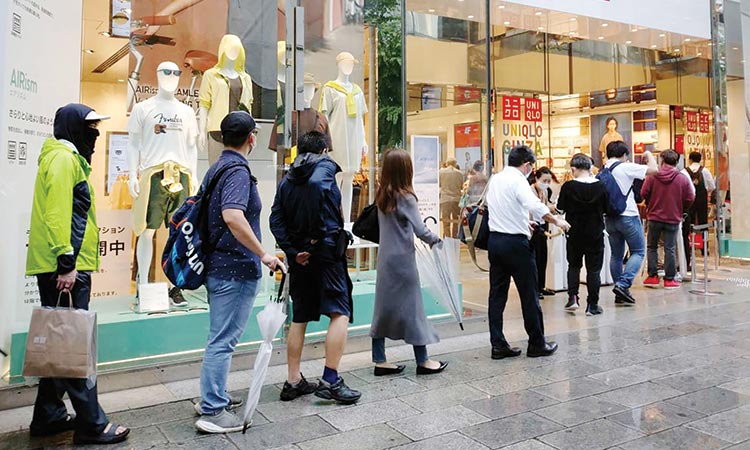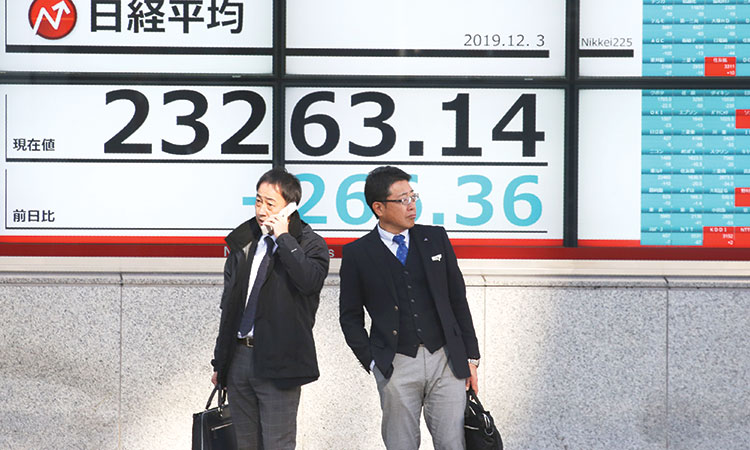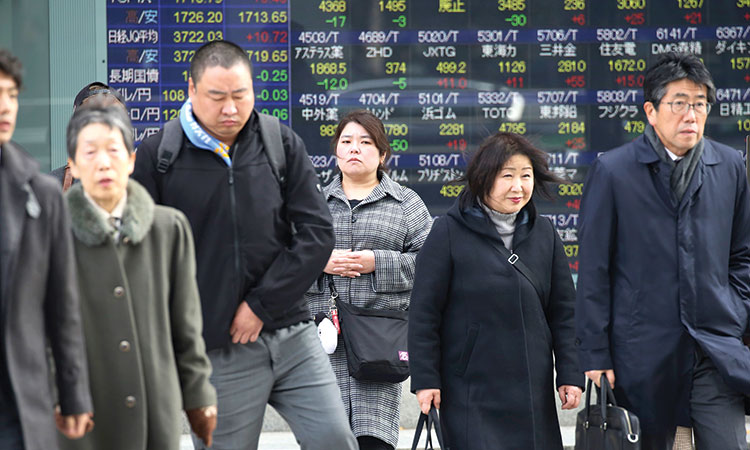Japan core consumer price index falls for second straight month

People wait in line at a clothing store in Tokyo. Associated Press
The data will likely complicate the Bank of Japan’s (BOJ) job of restoring growth and inflation, with a raft of recent indicators suggesting the nation is in the grip of its worst postwar economic slump.
Several BOJ board members warned that stronger monetary support and closer policy coordination with the government were needed to prevent Japan from returning to deflation, minutes of the bank’s April meeting showed.
“With the pandemic hurting the economy, there’s a good chance Japan may slide into deflation. Downward pressure on prices will likely persist throughout this year,” said Yoshiki Shinke, chief economist at Dai-ichi Life Research Institute.
The nationwide core consumer price index (CPI), which includes oil but excludes volatile fresh food prices, fell 0.2% in May from a year earlier, government data showed on Friday.
That compared with market forecasts of a 0.1% fall and followed a 0.2% drop in April, which was the first year-on-year decline since December 2016. The BOJ kept policy steady this week after expanding stimulus in March and April. But governor Haruhiko Kuroda conceded that inflation would remain well short of its 2% target for years to come.
The downturn in growth is also likely to have been exacerbated by Japan’s state of emergency in April through late May, which prompted people to stay home and businesses to close.
As businesses re-open after the lifting of lockdown measures, the government raised its economic assessment in June for the first time since 2018.
Japan also lifted all coronavirus-related curbs on domestic travel on Friday, with Prime Minister Shinzo Abe calling on people to go sightseeing or attend events to help the nation’s economy bounce back.
But analysts doubt Japan’s economy can rebound strongly from an expected contraction of more than 20% in the current quarter.
Some BOJ policymakers were concerned that bolder steps are needed to prevent the country from slipping back to sustained period of damaging price declines, the April minutes showed.
“Japan is now facing the risk of deflation, so it’s possible to further enhance coordination between fiscal and monetary policies,” one BOJ board member was quoted as saying.
Meanwhile, Japan, the biggest taker of cheap dollar funding from the US Federal Reserve during the coronavirus pandemic, is weaning itself off that supply as it shies away from emergency swaps and returns to now sedate interbank markets.
When the Federal Reserve announced cheap dollar swap lines for global central banks in March as it tried to stave off a dollar funding crunch wrought by the pandemic, Japan was first out of the blocks. From April through this week, the Bank of Japan was the biggest user of that cheap funding, taking up as much as $225 billion or more than half of what was on offer, as a banking sector addicted to investing and lending overseas struggled to get the dollars it needed from interbank markets.
That helped Japanese banks and funds to keep investing in higher-yielding U.S. stocks and global bond markets, as they have traditionally done, to beat the near-zero returns on offer at home. Data this week, however, shows Japanese institutions are not keen to renew their three-month yen-for-dollars swap contracts with the Fed, which they access through the Bank of Japan.
The BOJ’s outstanding dollar swaps with the New York Fed stood at $171.4 billion on June 18, which is down from a peak set in late May but still accounts for 61% of the Fed’s total outstanding dollar swaps with major central banks.
Analysts expect Japan to steadily reduce its reliance on the Fed swap window, since interbank markets have normalised and banks would rather go there than borrow from what is deemed a central bank emergency window.
“Dollar borrowing costs have become cheaper, so Japanese banks would like to reduce unnecessary use of central bank swaps,” said Osamu Takashima, head of G10 foreign exchange strategy at Citigroup Global Markets Japan.
“Too much reliance on central bank swap lines is not healthy. Of course, Japanese banks recognise this.”
The cross-currency basis swap - the premium investors pay over interbank rates to swap yen for three-month dollars — is currently 17 basis points. In March it blew out to 152 basis points.
Reuters







